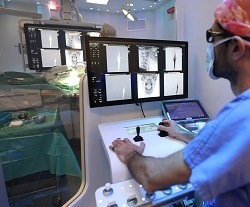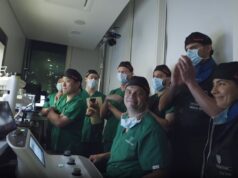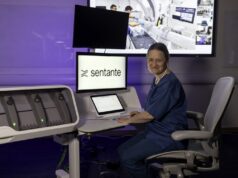
Robocath today announced its successful first robotic carotid stenting at Rennes University Hospital. This breakthrough in the neurovascular field was performed on 16 November 2021, using Robocath’s R-One robot, operated by François Eugène (Rennes University Hospital, Rennes, France) and his team.
The procedure was part of a clinical study, which is the first stage of an ambitious research programme launched in July by Robocath and Rennes University Hospital, in partnership with Philips France. According to a Robocath press release, it aims to enrich current and future generations of robotic platforms, with the long-term view of improving the treatment of cerebrovascular incidents.
“I am honoured to be one of the first operators in the world working in neurovascular robotics,” said Eugène. “Until now, there were no clinical investigations in Europe in this area, despite all its potential benefits. Every year, 5.5 million people around the world die from a stroke, and one in two stroke victims live with lifelong consequences. The reason for this is a lack of comprehensive health coverage, due to a shortage of qualified operators and hospitals capable of performing this type of procedure. Strokes must be treated quickly but also with extreme precision.
“Robotics can operate with millimetre accuracy and offer new possibilities in terms of movement, as well as bringing more comfortable working conditions. In time, I am sure that robotic assistance will provide the population with optimal stroke treatment and equality of access to care in France, as well as in other countries facing the same public health issues.”
Lucien Goffart, CEO of Robocath, added: “Strokes are currently the second most common cause of death worldwide. However, there is huge inequality in terms of care provision. The success of treatment is highly dependent on the operator’s level of experience and the proximity of a centre capable of treating the condition. Our robotic solution will enable procedures to be more precise and more reliable, which will benefit stroke patients by greatly improving their treatment. Linked with our remote connection module, in the future our technology could treat 100% of patients in the best possible conditions.”










